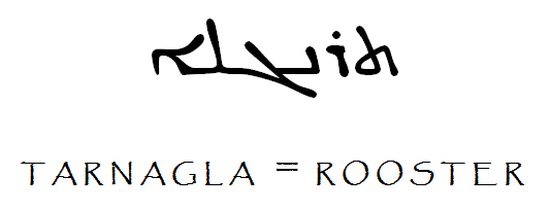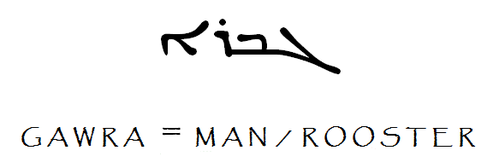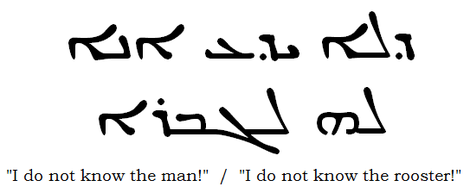Peter’s Denial and the Cock’s Crow
By Jeremy Chance Springfield
In the book of Matthew chapter 26, the night before Messiah was to be crucified, and after the Passover meal was eaten, Messiah made the declaration that all of His students would flee from Him once His persecution began. Simon Peter made the bold statement that he would never deny his Teacher. This prompted the Messiah to prophesy that Peter would deny Him three times that night before the rooster crowed. Unfortunately, Messiah was indeed correct, and we read in Scripture of the terrible denial and reviling that Peter expresses before the cock crows.

In the ancient Aramaic Peshitta text of the book of Matthew, there is an amazing hint that more was actually going on than just a rooster’s crowing to signal the denial of Yeshua by Peter. In Aramaic, the general term for “rooster” is TARNAGLA. That is the actual term that Yeshua spoke in His prophecy of the coming denial in 26:34.

However, there is another term for "rooster" in both Hebrew and Aramaic that is significant to note. The term GAVER in Hebrew can mean “rooster / cock,” but it can also mean “man.” In Aramaic, the word is pronounced just slightly differently: GAWRA, instead of GAVER, but can still mean both terms, depending on the context in which it is used.
In first century Israel, there were no mechanical or electronic alarm-clocks, and so the duty of awakening the priesthood for their daily sacrificing fell to an individual man who would climb up to a high point in the Temple and literally “cry out” in the pre-dawn hours to rouse the priests who slumbered in their chambers at the Temple. This man was given the title “GAVER / GAWRA” because he acted just like a rooster to herald the dawn. Specifically, he is said to have stated the following three proclamations every single morning:
“All the priests prepare to sacrifice!”
“All the Levites to their stations!”
“All the Israelites come to worship!”
Therefore, it is highly likely that the “rooster” referred to here in the Aramaic passage is actually a reference to the individual who was calling out, and not really a bird at all. This is supported that the word for “crow” simply means to “call out.” This is of note to us because of the denial of Peter. At this early point in the tribulation of Messiah, Peter had already bowed out, had already basically said “Enough! I can’t handle any more!”
With the cry going forth after he had totally denied Messiah, and when one understands what that cry might very well have consisted of, if indeed it had been the priest and not the actual bird, then it is like the Father was bringing it home to this student of Messiah: “It is only starting! There will be a sacrifice today! There will be blood spilled today!” The full intent of what Messiah had told him likely came as a crushing blow when he realized exactly what the consequences of his denial entailed – and it was going to get much worse!
“All the priests prepare to sacrifice!”
“All the Levites to their stations!”
“All the Israelites come to worship!”
Therefore, it is highly likely that the “rooster” referred to here in the Aramaic passage is actually a reference to the individual who was calling out, and not really a bird at all. This is supported that the word for “crow” simply means to “call out.” This is of note to us because of the denial of Peter. At this early point in the tribulation of Messiah, Peter had already bowed out, had already basically said “Enough! I can’t handle any more!”
With the cry going forth after he had totally denied Messiah, and when one understands what that cry might very well have consisted of, if indeed it had been the priest and not the actual bird, then it is like the Father was bringing it home to this student of Messiah: “It is only starting! There will be a sacrifice today! There will be blood spilled today!” The full intent of what Messiah had told him likely came as a crushing blow when he realized exactly what the consequences of his denial entailed – and it was going to get much worse!

Additionally, there is even a stunning word-play in what Peter said in 26:72-74 that really stands out when you read the original text: D’LA YADAYA ANA LEH L’GAWRA! = “I do not know the Man!”
As soon as he said this, we read that the rooster crowed. Remember that the term GAWRA, meaning “man,” can also be understood in the sense of “rooster.” Obviously Peter meant that he did not know the “man,” but due to the proximity to and context of the rooster’s role, it should not be missed that the cry went forth right after he uttered the word GAWRA, which is also the Aramaic word for “rooster!” So as soon as he uttered the word for “man / rooster,” which is also the term used for the Temple crier who called for the beginning of sacrificial preparations, he had to have immediately realized the dark truth of the Messiah’s prophecy was being fulfilled. His Teacher’s death had not even begun, and he had already affirmed that he could have no part in the grim process of salvation
The same goes for us: we have all fallen at some point in our faith. We have all experienced times of denial to some degree, and yet, salvation is sure, because it is not dependent upon our frail faith, but on the victorious faith of Messiah, who alone is its great Author and Finisher.
As soon as he said this, we read that the rooster crowed. Remember that the term GAWRA, meaning “man,” can also be understood in the sense of “rooster.” Obviously Peter meant that he did not know the “man,” but due to the proximity to and context of the rooster’s role, it should not be missed that the cry went forth right after he uttered the word GAWRA, which is also the Aramaic word for “rooster!” So as soon as he uttered the word for “man / rooster,” which is also the term used for the Temple crier who called for the beginning of sacrificial preparations, he had to have immediately realized the dark truth of the Messiah’s prophecy was being fulfilled. His Teacher’s death had not even begun, and he had already affirmed that he could have no part in the grim process of salvation
The same goes for us: we have all fallen at some point in our faith. We have all experienced times of denial to some degree, and yet, salvation is sure, because it is not dependent upon our frail faith, but on the victorious faith of Messiah, who alone is its great Author and Finisher.
All study contents Copyright Jeremy Chance Springfield, except for graphics and images, which are Copyright their respective creators.